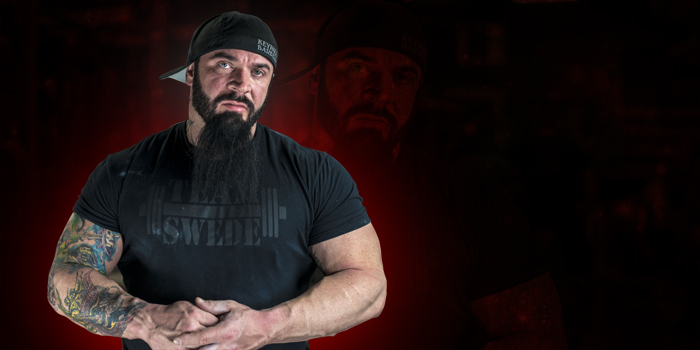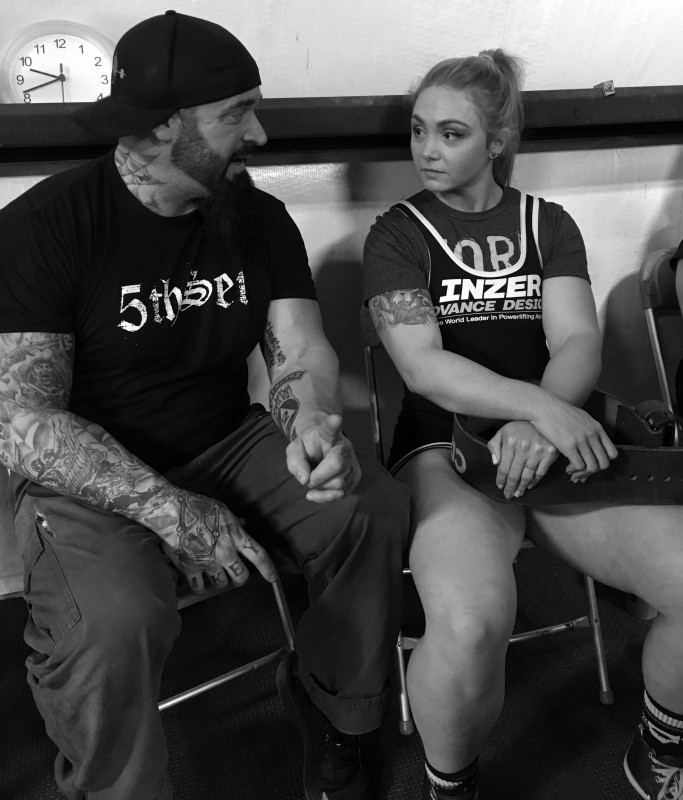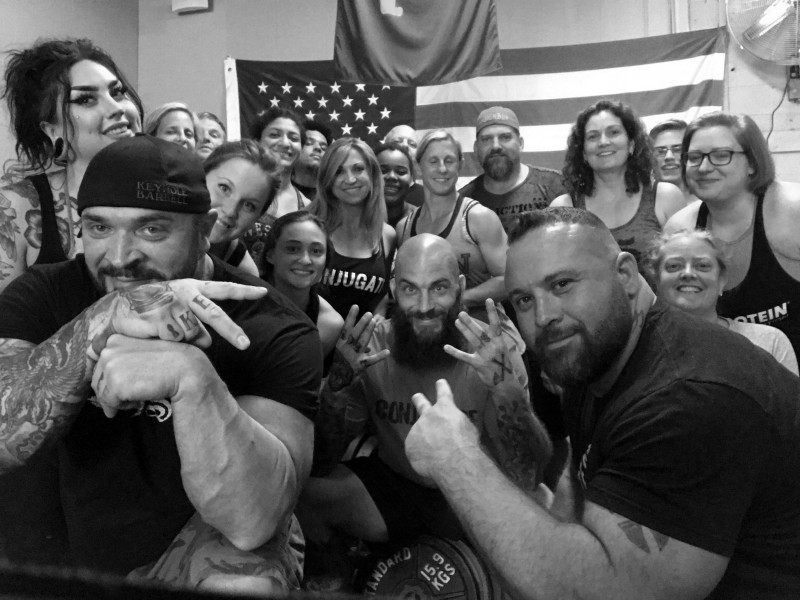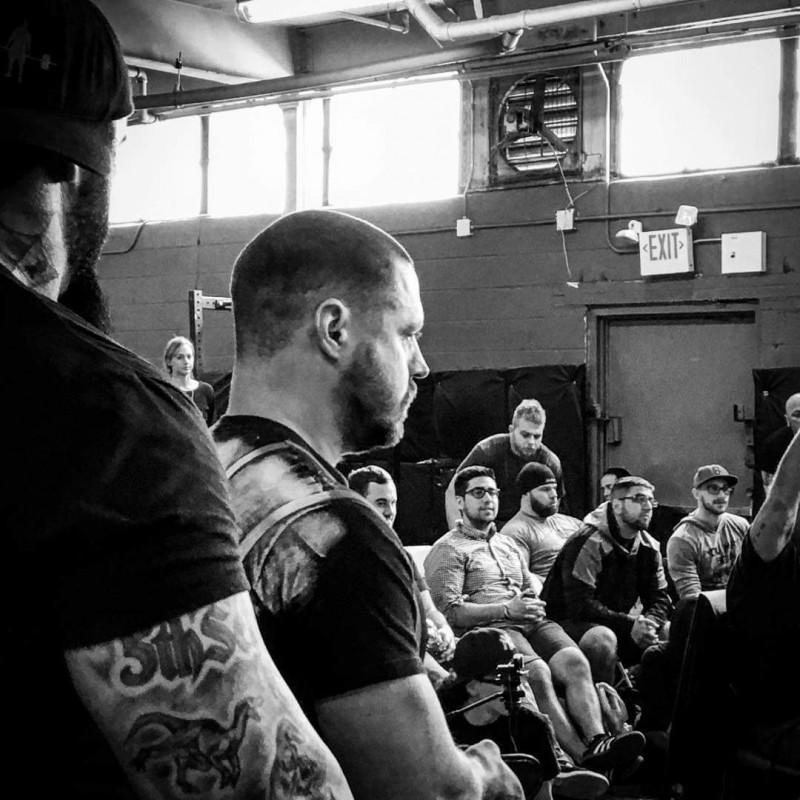
I am reticent moving into writing this article because I know so many of you, when you read the topic, will shake your heads and dismiss it as something you already have covered. I would. I have in the past. After spending so much of the last week reeling, in my own mind, I can see areas where I've fallen short.
The topic is accountability, but there are levels to this.
There is the type of accountability I was discussing with JP Carroll on one of our Table Talks last week, which was more about trusting someone, like a coach, or a group of people, like the crew you train with, to hold you to a standard and, for lack of a better term "keep you accountable." Sometimes when you're in the thick of things, it's hard to see clearly or make the right calls, because each of us influenced by our own personal pair of rose colored lenses, through which we view the world. Feelings, emotions, impulsive desires and a list of other factors about as long as an Alaskan winter can skew the way we perceive our decisions and the resulting outcomes, as well as the interconnective nature of the two.
They say hindsight is 20/20, but that's not always the case. It's a lot easier to accept that you made a poor decision which resulted in a shitty outcome, or that the poor decision you're about to make will result in said shitty outcome if you hear it from someone you trust.
You're about to max out in the middle of a training cycle, even though your prescribed work calls for sets with 77%. Having someone you trust and respect to "keep you accountable" can make all the difference in the world regarding how you will approach that decision. Reading the scenario I just mentioned, it seems like a forgone conclusion it would be a stupid idea. Those rose colored lenses, though. They can change the picture you see in real time. Trust me.
Life is like that, too.
Now to some degree, this is still you being accountable, by allowing that person or those people to hold sway or influence on your decisions and point out when you make bad calls. It takes some heart to be open to it, and bravery of that kind is almost always rewarded.
What I want to talk about in this article, however, is another level of accountability, altogether. One which I strive to keep in check, consummately. I'm talking about removing the rose colored lenses, cleaning them off and placing them back in their case for a bit: improving the level of clarity with which I view my circumstances, options and eventually decisions. This is called personal accountability.
But, how do we do that?
It's no easy mission. I will give you that much. Reactions, impulses, feelings, and emotions are all intrinsic to the human condition. Though they tend to bring to bear results which oppose what we'd prefer, most of us still allow them to color our choices. We long for the things which will ultimately undo us.
Allow me to share the way I navigate these treacherous waters, in hopes that you can use these ideas to take the helm of your own affairs, in training, business and even your personal life. I have a list of "adversaries to accountability" I use check myself. If the factors I listed above which distort our perceptions are rose colored lenses, think of addressing these "adversaries" as wearing clarifying, prescription glasses. When we recognize them, we can use that to improve our chances of seeing everything in our path and on our horizon, clearly, so we can make the calls, before and after the fact, which suits our best interests.
Part of personal accountability is self-awareness. No checklist or cheat sheet is going help you if you're not willing to go into things with your eyes open, and willing to be wrong. Self-awareness is as rare as it is important. Those who have it go light years further than those who do not.
How sad is it to watch someone who doesn't?
When faced with the consequences of their own decisions, they fumble to point their finger in any direction but their own, as desperate, emotive phrases fall out, inexorably, more like prayers than normal means of communication. Yet, the consequences remain and there is no hope in sight for similar choices to not be made in the future. We've all been there, but no one has to stay there.
Use these tools to hold yourself accountable, before and after the fact.
Adversaries to Accountability
- Pride
- Dishonesty
- Anger
Pride
Ask yourself: "Is my own pride affecting how I view this situation?" A good way to test this is to take yourself out of the equation.
If someone else did what you have done, or was making the decision you're about to make, would your perception of that action or decision change? I do this all day long in my head. I'm always asking myself: If one of my lifters was going to do this, or had done this, what would I say? I'm in a unique position, as a coach who gives advice for a living, which provides me a lot of experience to draw from, but anyone can use this problem-solving tool. You'd be surprised how sobering it can be to take yourself and your own pride out of things.
When I feel good in training and I want to do some extra work in a given session: What would I say to one of my lifters about that decision?
I'd say "no." Pretty simple philosophical razor, that.
Things get a little more sticky, after the fact. This is even more so the case when dealing with pride in our personal lives and how our decisions affect those around us. Pride will rush to the defense of our egos when we've made or make decisions with shameful consequences.
"Is this going to hurt someone I care about."
"Did this hurt someone I care about?"
We don't always do the best with these things. Owning mistakes after the fact can go a long way in preventing the same behavior from happening in the future. This leads to the next "adversary."
Dishonesty
Personal accountability is all about taking responsibility for our actions. The first part of accepting the consequences of the choices we make and actions we take is being honest about every aspect of them
Let's use the same example from before and apply it to this. The guy maxing out when his prescribed work is at 77%.
"I didn't think it would mess things up if I took a max."
Now that is some Mike Tyson "I broke my back. It was spinal." type of shit right there.
You knew damn well that wasn't the best move and you chose to do it anyway. We need to own these decisions and be honest about our motives, in order to learn from mistakes and prevent them in the future. Lying to other people is one thing, but when we allow ourselves to be dishonest with ourselves, we are in sad shape.
A good exercise in accountability is saying it out loud or writing it down. That's what I do. If someone else was affected by my actions, I make myself say it to them.
"I knew that was a bad decision and I did it anyway because I wanted to. Now I'm willing to face the consequences."
Something as simple as that can make a huge difference moving forward and help stop me from repeating the same mistake again, down the road. I don't enjoy admitting when I'm wrong like most people don't. But it keeps me from becoming a scumbag and railroading my personal life, business life, and training life. Without those things in check, I'd end up couch surfing in my thirties instead of living the life I love. Who wants that?
Another facet of this is being honest about the fact that, some decisions, we have no business making for ourselves. We simply aren't qualified. That does not lessen us in any way and acknowledging it puts us in a better position to be successful.
I hire an accountant to do my taxes because quite frankly, I don't know enough to handle that shit on my own. More than likely I'd miss things which could benefit me and do things which could get me all messed up. Staying in our own lanes is an important part of personal accountability and we can't do that if we aren't honest with ourselves about what our roles should be.
If you've been lifting for three years and think you are qualified to change the programming your coach gave you, you're probably falling into the category of someone who isn't being honest with himself about what his role should be. (You should be running 5thSet.)
Anger
When I mentioned feelings and emotions earlier, this one right here is definitely the biggest culprit in that group. Anger is a very base emotion and can seem like a reflexive response to pain of nearly any kind. But there is a little more to it than that.
Hit your thumb with a hammer? Anger. Betrayed by someone you trusted? Anger. Crashed your car? Anger.
I say it's a base emotion because anger reactions seem thoughtless, but they never really are. In fact, pain by itself is not enough to cause anger. Plenty of people who are in pain are not angry. There is a thought process behind anger which results in someone or something getting the blame for our pain, even if that process is instinctive.
Anger is easier to deal with than pain. It's distracting. People who are in pain tend to think about pain. People who are angry are focused on harming whoever caused them pain. There is always a target at which our anger is directed, even if it's ourselves.
If you look back on something you did, or a decision you made, while you were really angry, chances are: that emotion influenced things dramatically. This is common sense, but it's human nature to make excuses after the fact for our actions or try to defend or justify them. However, if we are being honest with ourselves, the way I mentioned in the last adversary, we can acknowledge that we should've handled things differently.
The guy who wants to max when he isn't supposed to knows it. He's mad about something that happened earlier and even though he probably knows maxing is going to have a negative effect on his training, he does it anyway. Maybe he blames himself for what happened and is trying to sabotage his training to punish himself.
We will probably never fully grasp on an individual basis why we do the things we do when we are angry, and that's alright. We can learn to acknowledge they were mistakes and not defend them. We can eventually learn to identify when we are angry and take a step back before doing any dumb shit.
I have to step off and have "Swede to Swede" talks before I end up acting out at least once a week. This type of thing is highly advisable for those of us who are able to identify our own anger before we act on it. It's kept me out of prison for creeping on twelve years now.
Personal accountability can be a struggle, but it's a point of pride for me. The kind of pride that comes from maintaining my own integrity, not the kind that will get me in trouble. I'm human and I err. Anger is always going to be an issue for me. But when I am wrong, I am the first to admit it. The reason is I don't want to keep being wrong and I realize being accountable is the surest way to prevent it. It's cyclical in that way.
As always, thank you for reading and please feel free to reach out to me with topics you'd like me to address in future articles. If you enjoyed this, share it.














1 Comment